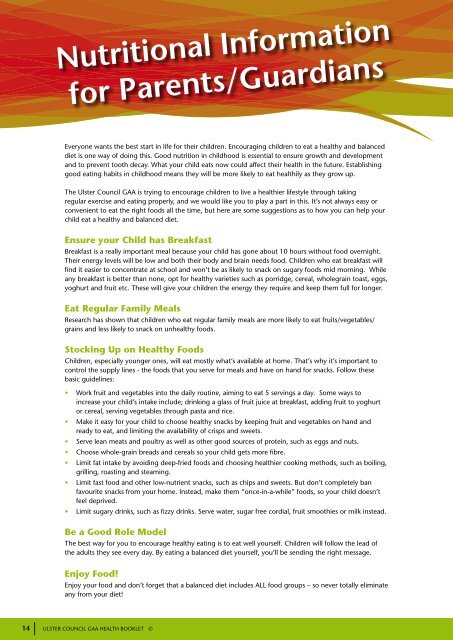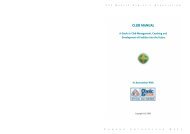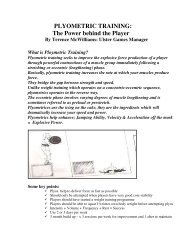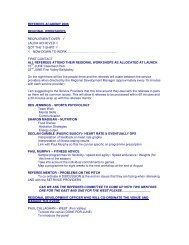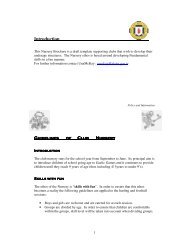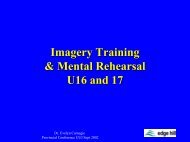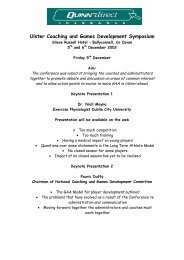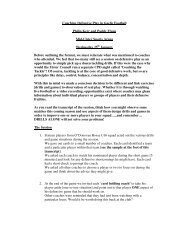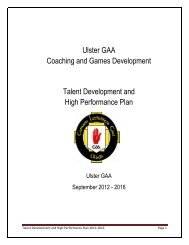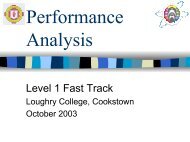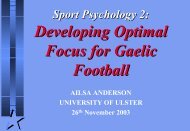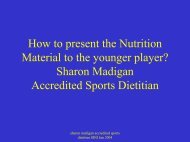Health Booklet - Ulster GAA
Health Booklet - Ulster GAA
Health Booklet - Ulster GAA
You also want an ePaper? Increase the reach of your titles
YUMPU automatically turns print PDFs into web optimized ePapers that Google loves.
Nutritional Information<br />
for Parents/Guardians<br />
Everyone wants the best start in life for their children. Encouraging children to eat a healthy and balanced<br />
diet is one way of doing this. Good nutrition in childhood is essential to ensure growth and development<br />
and to prevent tooth decay. What your child eats now could affect their health in the future. Establishing<br />
good eating habits in childhood means they will be more likely to eat healthily as they grow up.<br />
The <strong>Ulster</strong> Council <strong>GAA</strong> is trying to encourage children to live a healthier lifestyle through taking<br />
regular exercise and eating properly, and we would like you to play a part in this. It’s not always easy or<br />
convenient to eat the right foods all the time, but here are some suggestions as to how you can help your<br />
child eat a healthy and balanced diet.<br />
Ensure your Child has Breakfast<br />
Breakfast is a really important meal because your child has gone about 10 hours without food overnight.<br />
Their energy levels will be low and both their body and brain needs food. Children who eat breakfast will<br />
find it easier to concentrate at school and won’t be as likely to snack on sugary foods mid morning. While<br />
any breakfast is better than none, opt for healthy varieties such as porridge, cereal, wholegrain toast, eggs,<br />
yoghurt and fruit etc. These will give your children the energy they require and keep them full for longer.<br />
Eat Regular Family Meals<br />
Research has shown that children who eat regular family meals are more likely to eat fruits/vegetables/<br />
grains and less likely to snack on unhealthy foods.<br />
Stocking Up on <strong>Health</strong>y Foods<br />
Children, especially younger ones, will eat mostly what’s available at home. That’s why it’s important to<br />
control the supply lines - the foods that you serve for meals and have on hand for snacks. Follow these<br />
basic guidelines:<br />
• Work fruit and vegetables into the daily routine, aiming to eat 5 servings a day. Some ways to<br />
increase your child’s intake include; drinking a glass of fruit juice at breakfast, adding fruit to yoghurt<br />
or cereal, serving vegetables through pasta and rice.<br />
• Make it easy for your child to choose healthy snacks by keeping fruit and vegetables on hand and<br />
ready to eat, and limiting the availability of crisps and sweets.<br />
• Serve lean meats and poultry as well as other good sources of protein, such as eggs and nuts.<br />
• Choose whole-grain breads and cereals so your child gets more fibre.<br />
• Limit fat intake by avoiding deep-fried foods and choosing healthier cooking methods, such as boiling,<br />
grilling, roasting and steaming.<br />
• Limit fast food and other low-nutrient snacks, such as chips and sweets. But don’t completely ban<br />
favourite snacks from your home. Instead, make them “once-in-a-while” foods, so your child doesn’t<br />
feel deprived.<br />
• Limit sugary drinks, such as fizzy drinks. Serve water, sugar free cordial, fruit smoothies or milk instead.<br />
Be a Good Role Model<br />
The best way for you to encourage healthy eating is to eat well yourself. Children will follow the lead of<br />
the adults they see every day. By eating a balanced diet yourself, you’ll be sending the right message.<br />
Enjoy Food!<br />
Enjoy your food and don’t forget that a balanced diet includes ALL food groups – so never totally eliminate<br />
any from your diet!<br />
14 ULSTER COUNCIL <strong>GAA</strong> HEALTH BOOKLET ©


